
ORPHANED LAND – Let The Music Be Known
Anthony Morgan
June 2013
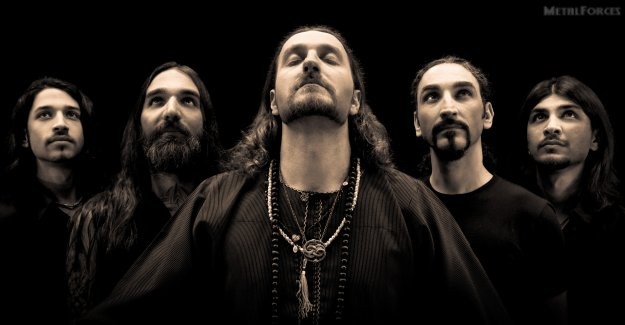 Orphaned Land (l-r): Chen Balbus, Uri Zelcha, Kobi Farhi, Yossi Sassi and Matan Shmuely |
![]()
Israeli heavy metal outfit Orphaned Land filmed two live performances at Reading 3 in Tel Aviv, Israel on December 9th and 10th, 2010. These respective jaunts formed the basis of October 2011 DVD The Road To OR-Shalem, a release which celebrated the 20th anniversary of the ensemble’s existence – Orphaned Land having formed in 1991 under the moniker Resurrection. The DVD’s completion paved the way for writing sessions to commence in preparation for a fifth studio full-length, the eventual result being June 2013’s All Is One.
“Usually, we used to bring out an album every six years,” observes Kobi Farhi, vocalist and co-founder of Orphaned Land. “We thought we should be faster this time, and should find the formula to make it faster. We started to work very seriously on the music – the first sketches turned out to be really great. I thought that I should give up growling on this album, and sing only with clean vocals. We wrote the songs to be more melodic, so the result is that we had a lot of more epic songs with more melodies. It was easier to write the album in a way, even though it sounds sophisticated and very much layered with all of these elements. It was great for us writing it – it was really fun. Even though the songs are very tragic and the album is very deep, it was the album that we enjoyed doing the most. We recorded it in three countries, and we used maybe five languages. It was really fascinating, and probably our best album to date.”
Orphaned Land’s studio output hasn’t been prolific to date, the group’s full-length discography consisting of Sahara (November 1994), El Norra Alila (July 1996), Mabool (February 2004), The Never Ending Way Of ORWarriOR (January 2010), and All Is One. “Our music is very layered with so many elements,” the frontman explains. “If you listen to the previous records, you can find so much going on in there, and we always did very long albums. The last album The Never Ending Way Of ORWarriOR was more than 78 minutes long, and Mabool was maybe around 60 minutes long. Our albums were always very long, and full of layers and elements. You can even discover new stuff on your tenth and 20th spins. It took time to arrange that, because the music was very much complex. It still is, but we figured out a way to make it a little bit more melodic, and to deliver it faster.”
All Is One is shorter in overall length, spanning roughly 54 minutes. “It just turned out that way,” Kobi muses. “We wrote in a different way this time, having a verse and chorus. Sometimes we didn’t used to work like that. We wanted the songs to be more upfront. We wanted to have everything more upfront; the front cover, the album title, the titles of the songs, and the songs themselves, including the vocals and stuff. We wanted everything to be more upfront and in your face, which is why there are cleaner vocals and shorter songs this time.”
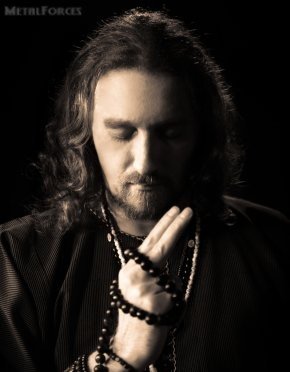
|
The record’s upfront nature causes it to perhaps have a greater accessibility than previous affairs. “I think it’s the most accessible, and I hope that it will also be the most successful as well,” the singer admits. “We don’t write music to try to be commercial, though. I guess we are just growing old and want to be more easy-going in a way, but it still has dark messages. I don’t think we are radio friendly by any means. Commercial isn’t something that we think while writing music. This album might have turned out to be more communicative and accessible to a lot of people who wouldn’t listen to growls and metal, but that wasn’t something that we thought about in the beginning. It was just something that we wanted to do.”
A sombre tone underpins All Is One’s lyrical preoccupations. “We wrote some very tragic songs on this album,” Kobi acknowledges. “For example, the song that ends the album – called ‘Children’ – is a very tragic song about children who are trapped in the middle of fire, in the middle of wars. These are children who are growing up with the sound of bombs and the Middle East is full of those children, whether it’s Iraq, Iran, Israel, Palestine, Lebanon, Syria – of course what’s going on over there now. I’m just fed up with the grown-ups of the world being such small kids, because it’s irresponsible for the ones who are really kids in this world. I wrote this song with literally tears in my eyes, and hoping one day that those kids will have a better life from us. The grown-ups who can really give them that.
“‘Let The Truce Be Known’ deals with two soldiers who are meeting on the battlefield. They become good friends but accidentally they kill each other, because this is still a battlefield and this is still a war. ‘Our Own Messiah’, that’s also a great song. It just deals with the question, ‘How can it be that we pray forever with our prayers to God, but nothing is changing?’ Nothing is really becoming better. No messiah is coming to rescue us. Even Jesus hasn’t been resurrected for thousands of years, so why do we keep praying all of those prayers and waiting for the Messiah instead of changing the reality and creating a better world ourselves? That’s a very good song with very good lyrics.
“Those songs are really about death, about conflict, and about the bloodshed we are creating by realising that if we save ourselves then all is one. The album title, All Is One, you can see a huge utopia going on on the front cover with us using all these elements from religions and combining them into one euphoric logo. The truth is that people can see that cover or the name of the album though, and they can think that we are some kind of peace and love creatures, that we are like saints or missionaries who say that religion is good. That’s really not the case, though. The thing is, the album title and the cover are in complete contradiction to what’s going on inside of the album. They are just a dream that we wish to achieve, but the songs themselves are more of the reality of what’s going on really in our daily lives.”
Albeit Israeli, Kobi isn’t religious in sentiment. “I have a lot of respect towards religion,” the mainman highlights. “I grew up in Israel, and Israel has a lot of heritage with religion; all of the religions are important in Israel, and they have a big influence on people. I have become disappointed with religion throughout the years, though. I saw that it doesn’t succeed in creating a better world for us. I think that we’ve succeeded with Orphaned Land in creating better friendships, and give much more hope than religion has. I find it to be ridiculous, because we are just a metal band. How can it be that all of the politicians all of the religious leaders cannot create a better world where children aren’t dying? Where children aren’t grown to be soldiers in the army? If we can succeed in doing that as a small metal band, of course they can do it as the big people who manage this world. I’m very disappointed, and I know that they think we don’t want it.”
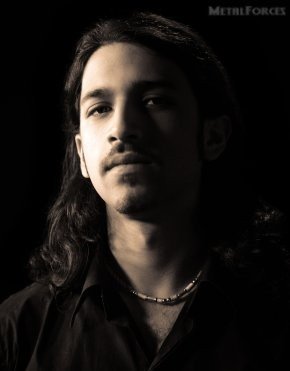
|
Unlike many of his fellow countrymen, Kobi adopts a neutral stance with regards to Middle Eastern politics. “I think that both sides are to blame,” he submits. “Even though I’m Israeli and I’m Jewish, when a kid is dying, I don’t care if it’s a Palestinian kid, or if it’s a Syrian kid, or if it’s an Israeli kid, or if it’s a British kid. I don’t want children to die in the stupid world of the adult people. That’s something that I cannot live with, and cannot accept. That’s about it. I don’t take any sides with Orphaned Land; we’ve never said if we are right-wing, or left-wing. We never expose any political ideas, because being a musician is such a privilege that you can be above politics. This is also the reason why we have thousands of fans from the Arab countries, even though we’re Israeli and Jewish. Music is above that. When we play our music, we play it for everyone. We play them for Muslims just as much as we do for Jewish people.”
Israel’s establishment harbours warm feelings towards Orphaned Land. “It’s very positive, because we are great ambassadors for our country and our nation,” the lyricist discerns. “People are really proud of us, because we never express any political opinions. All people from the left-wing and the right-wing don’t really know what our opinion is, so they are free to support us and to be proud of us as a band who brings a lot of respect and honour to the country and to our nation for a change. There is a band who brings good news for Israel after Israel is manufacturing so much bad news, so everybody’s really proud of us.”
An Israeli entity boasting a healthy Muslim following is quite an anomaly, to say the least. “It’s outrageous,” Kobi agrees. “It’s unbelievable. I think that we are the most popular Israeli people in the Muslim / Arab world, and we are just a heavy metal band – people need to remember that. It’s outstanding.”
A heavy metal scene exists within Israel. “There’s a very big scene in Israel,” the vocalist reckons. “All the big bands have played in Israel; we’ve played with Metallica in Israel, and when we play a show in Israel lots of people come. You can find bands of all kinds, from thrash metal to black metal to heavy metal to progressive metal. The scene is very active, and lots of bands are coming to play shows in Israel.”
At the time of writing however, Orphaned Land are Israel’s most successful metal act. “I guess that we are probably the most successful metal band to come out of the Middle East, because we are also the oldest band,” Kobi informs. “We started Orphaned Land 22 years ago, and we were the first ones in the world to use these Oriental motifs and these Middle Eastern elements in such a strong way in our music. We were actually the pioneers of Oriental metal, and probably being so old and being the pioneers of the style… Maybe those were some of the reasons why we succeeded in getting out of the country, and also succeeded in Europe and the USA.”
Orphaned Land’s fan notoriety was particularly evident an October 23rd, 2012, a fan launching a petition via gopetition.com which encouraged the Norwegian Nobel Committee to nominate the band for the 2013 Nobel Peace Prize. “I was embarrassed, because we didn’t start the band to get peace awards,” the frontman stresses. “I really find it embarrassing, but also very flattering to see that fans care about us so much that they do these petitions for us, and that they want to reward us for our efforts. To be honest though, I would give up any Nobel Prize just to… I would be ready to exchange it for living in a better place where children aren’t dying. I would give up the money and the fame, and I would write happy songs. I would be willing to give up any prizes just so that people learn to live together.”
In comparison with past studio efforts, All Is One’s lyrical demeanour is more straightforward. “I think the lyrics are much more upfront this time, and easier to understand on the first spin,” Kobi analyses. “One of the reasons that we did it is that we have been here for 22 years now with Orphaned Land, and we’ve singing about the same topics and using the same words for 22 years now. If you check our lyrics from 22 years ago, you will find the same topics. Nothing has really changed. We always try to make it stronger and we want to make it more in-your-face, so those were one of the reasons why we wanted to keep the lyrics a bit more simple and in-your-face.
“It’s hard to tell what we will do in future though, because I can never tell what we will do in the future. It could even be that we will do more growls next time. It really depends on what we want to say, what will be the concept, and what will be the subjects that we want to deal with. I don’t know, really.”
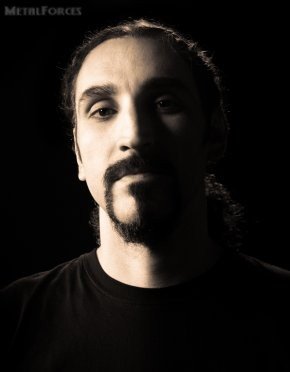
|
Growls aren’t audible, the singer favouring a clean vocal approach. “Some of the songs that I wrote are very tragic, and full of emotion,” he notes. “I thought that I should give my clean vocals a chance to take over, and to try to bring emotional vocals into the songs. Growling usually fits for me when it’s anger or really fear, and those feelings. I felt that for this album, I really wanted to use more emotional vocals, and more upfront vocals where people can understand the lyrics and can sing along. It was just something that I felt I wanted to do for this album. I’m not necessarily going to do it on future albums, but it felt right for this one.”
All Is One’s recording locations span across three countries, namely Israel, Turkey, and Sweden. “We had a great budget for the album this time, so it was really great to have the ability to fly to Turkey and to record the string and violin players from Turkey,” Kobi enthuses. “Both the strings, the orchestra, and the choir all had a conductor. I gave them sketch recordings of the parts that I wanted them to sing on. I gave them some guide of myself singing very roughly some of the parts that I wanted them to sing. They conducted it with lyrics, and did some parts for each one of the voices and the violins. They know how to play in a very special way. That’s how we did it, so it was a co-operation between me and them. It looks like we will use a backing track when we play live. Otherwise, there will have to be 40 people onstage. That would be impossible. We will try to solve it and play live as much as possible, but we probably won’t be able to do all of it.
“We also had the ability to fly to Sweden to record at Jens Bogren’s Fascination Street Studios, which is one of the most famous metal studios in Europe. He’s a very famous metal producer, and we really like the results of CDs he has recorded with Opeth and with loads of other bands. He’s just doing great records, so we thought that it would be a great thing to work with him. He just mixed the album, though. We were looking for an organic mix. We’re not big fans of these triggers and sound replacements, where the music sounds like machines are playing it. We really want to feel that human beings are playing it. We were looking for an organic sound, to keep it natural and stuff like that.
“It was a great adventure. It took us maybe three months to record the whole album. It was very hard-working; we worked hard day and night. The rest of the stuff like the choir and some of the instruments like bouzouki and percussion were recorded in Israel, so it was a great adventure. There were lots of flights and it was a long process, but it’s great to have that behind us. Recording an album is always a very hard process, so I’m very happy that we’ve finished with it and now we can share the music with the whole world.”
An outside producer wasn’t hired, Orphaned Land instead favouring a self-production. “I think we know best how to produce ourselves,” the mainman judges. “We have our own agenda for our music, so I think we are doing it the best. We’ve never worked with a producer in the past, but we’ve always had co-producers. Even though we worked with Steven Wilson from Porcupine Tree, he was a co-producer and mixed the album. We are always the producer of ourselves.”
It was revealed on June 11th, 2012 that guitarist and co-founder Matti Svatitzki had parted ways with Orphaned Land, following a 21-year tenure. Chen Balbus was recruited to occupy the vacant position. “He was a fan of the band,” Kobi shares. “He was always recording YouTube video clips of himself playing our songs. He was a very talented guy. It’s like the classic story of the fan who became the guitarist of the band he admired. We used to follow his work, and he used to be very ambitious. He recorded YouTube clips of all of our songs, I think.
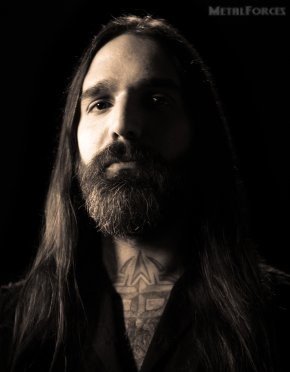
|
“At some point he became the replacement guitarist for Matti or Yossi, because one of them could not come to a show because of illness – stuff like that. When Matti left the band a few months ago, it was just a natural thing for Chen to take over the position. He was already so much in love with the band, devoted to the band, and understanding of the spirit of the band. It was just a natural thing for him to get in, and take over. We are very happy with him. He’s a great guitarist, a great human being – a very humble human being – and very talented. He was a great part of the new album.
“First of all, in technical matters he really helped us to be able to deliver an album faster. He worked at his studios, and he’s very fast and very motivated. When he wanted to change some stuff, he was like ‘Do this,’ ‘Do that,’ ‘Change it here,’ ‘Make this one longer’ – all these comments. He used to do them so fast and send it over to us that we succeeded in proceeding very fast. That was one of the things. He has great ideas for arrangements, and he wrote some great riffs on the album. I really think that part of us succeeding in making the album so fast is mainly because of him.”
Despite Matti’s departure, the composer nonetheless has fond memories of his erstwhile bandmate. “Matti was one of a kind,” he argues. “Matti used to write these riffs where I could easily tell that they were riffs of his. Matti became a little bit unmotivated in the last few years though, because he started to invest some time in family life and a career. I started to feel that we were losing Matti, and that we had had more of Matti in years gone by than in recent years. Matti was one of a kind, though – he was definitely one of a kind. We’ve stayed very good friends. Actually, he just sent me an email ten minutes ago. He said that he’s heard the new song, and that he’s very happy and very proud. He wished us all the best. We’re still good friends, and we’re keeping in touch. It was nothing. There is no blood between us – there was no fight, or something like that.
“Chen is very young, actually. He’s younger than Orphaned Land; Orphaned Land is 22-years-old, and Chen is 21-years-old. He still has a lot to learn, but I believe he has a very bright, big future in front of him and that he’s gonna be one of the main characters in Orphaned Land. I’m sure about it.”
Should Matti author suitable material in future, Orphaned Land might potentially cut said material. “One of the co-writers for the new album is Sami Bachar,” Kobi divulges. “Sami was the first drummer for Orphaned Land. We always keep in touch with the former members of the band. Sami wrote a few parts for the new album, even though he hasn’t played with the band for 13 years or something like that. This is something that we always welcome. If Matti calls me and says that he wrote a new song, then I will gladly hear it and think of what to do with it of course.”
All Is One’s cover artwork was designed by Valnoir of Metastazis. “It’s definitely a utopia that appears on the cover,” the frontman describes. “Something that we dream, something that we wish, and something that we think should happen between all religions. This is utopia though, and it isn’t happening. We did a big contradiction between the album cover and title and what’s going on in the songs, because the songs tell the complete opposite. It’s as if the songs are the reality while the cover art is the dream, or the mission, or the holiness that we’re trying to achieve. I think it’s a great artwork; it’s a very, very nice graphic design, and I really love it. Valnoir has also done cover artwork for Paradise Lost and Morbid Angel. He likes to deal with gold and we also like gold very much, so it’s a really great work.”
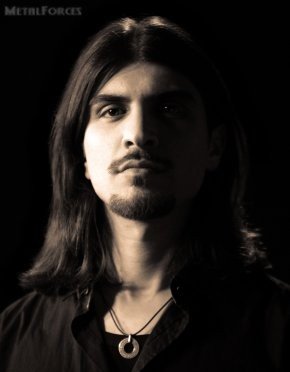
|
A video for the composition ‘Brother’ surfaced, the video in question consisting of studio footage filmed at Fascination Street Studios in Örebro, Sweden. “‘Brother’ is a very sincere ballad that I wrote,” Kobi discloses. “Basically, it’s like a letter from Isaac to Ishmael. I don’t know if you’re familiar with the Bible story where Abraham has two sons, Ishmael and Isaac. The Jewish people consider themselves to be the sons of Isaac, while the Arabs consider themselves to be the sons of Ishmael. The conflict between Jews and Arabs is so big that people – Jews and Arabs even – have forgotten that they’re related through these brothers. The conflict between the two brothers and the conflict between Israelis and Arabs even starts at the time of the Bible, so I decided to go to the source of the problem and to write a song from the source.
“It’s a very sad ballad – it’s a ballad, not a metal song. I think it’s a great song where I’m asking my brother to forgive me, even though I don’t feel that I did something wrong or that he did something wrong, or that any of us is to blame. I feel that I need to be the grown-up brother here though, and to be the first one to say that I’m sorry, that I want to repair things, and that I want to make things better. I want Jews and Arabs to remember that they are brothers, and I want them to live together. ‘Brother’ is a very deep song on the album; the story of this song is great, and the lyrics are just great. I think that lots of people are going to love it.”
The singer reads extensively about Middle Eastern history. “I’m a citizen of the Middle East, so I’m very much interested in all of the history and the culture – Christianity, Islam, and Judaism,” he reasons. “I’m very interested in understanding why conflicts exist, and why religions are the way they are. I’m coming from a place with a huge heritage of history; wars and bloodshed and religion were formed here, so of course this is something I feel obligated to do. It’s fascinating for me to learn those facts. It helps me to shape my opinion about those subjects that I want to sing about, and stuff like that.”
Reading has influenced Kobi’s opinion regarding specific subjects. “I used to practice and follow religion, but in the last few years I’ve become really desperate and bitter about the fact that we cannot change the situation in the Middle East, and about the fact that children are still dying,” he laments. “I started to be frustrated with the leaders and with the politicians. It’s like I awakened to see that I’m surrounded by people who really don’t want to end this. It doesn’t matter if they are religious people or if they are politicians. I just feel that I succeed in doing more with my heavy metal band. On the one hand it’s amazing and flattering, but on the other hand it’s completely ridiculous.”
All Is One was released on June 24th, 2013 in Europe and subsequently on the 25th in North America, all via Century Media Records.
Interview published in June 2013.
Related Posts via Categories
- SCOTTISH SICKNESS – A Report On The Scottish Death Metal Scene, Featuring BRAINBATH, PUTRID FATE And RANCID CADAVER (October 2022) | Features / Interviews @ Metal Forces
- LARVAE – Join The Hardcore Cult! (June 2022) | Features / Interviews @ Metal Forces Magazine
- TRENCH FOOT – Sacrificing Morals For Gory Obscenities (June 2022) | Features / Interviews @ Metal Forces Magazine
- L.A. GUNS – Trigger Happy (March 2019) | Features / Interviews @ Metal Forces Magazine
- CANCER – Crimes So Evil (November 2018) | Features / Interviews @ Metal Forces Magazine
- U.D.O. – The Tank Drives On (August 2018) | Features / Interviews @ Metal Forces Magazine
- SIEGE OF POWER – Bleeding For The Cause (August 2018) | Features / Interviews @ Metal Forces Magazine
- MOONSPELL – A Taste Of Live Eternity (August 2018) | Features / Interviews @ Metal Forces Magazine
- MONSTROSITY – Dark Matter Invocation (August 2018) | Features / Interviews @ Metal Forces Magazine
- SATAN – Five Magicians (August 2018) | Features / Interviews @ Metal Forces Magazine
|
|





